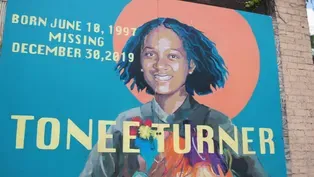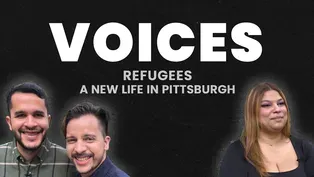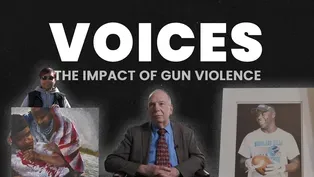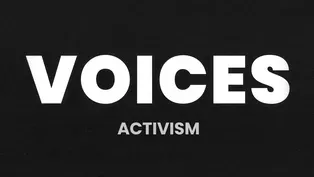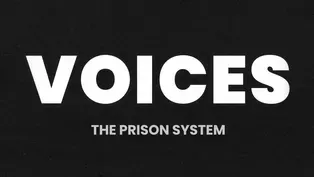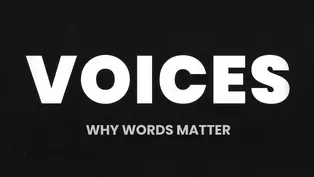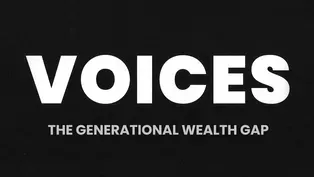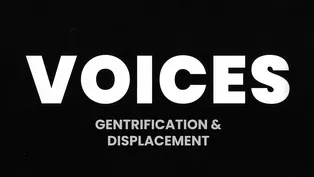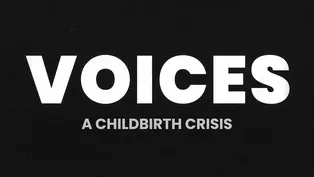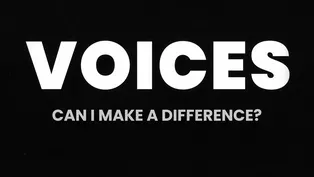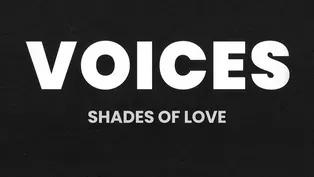WQED Digital Docs
VOICES: Pittsburghers on Racism and Resilience
5/11/2021 | 10m 45sVideo has Closed Captions
Pittsburghers of different backgrounds share their encounters with discrimination.
Pittsburghers of different racial and ethnic backgrounds share their encounters with racism and discrimination in this region. They reflect on their personal healing while offering thoughts on the challenges and possibilities for change.
Problems with Closed Captions? Closed Captioning Feedback
Problems with Closed Captions? Closed Captioning Feedback
WQED Digital Docs is a local public television program presented by WQED
WQED Digital Docs
VOICES: Pittsburghers on Racism and Resilience
5/11/2021 | 10m 45sVideo has Closed Captions
Pittsburghers of different racial and ethnic backgrounds share their encounters with racism and discrimination in this region. They reflect on their personal healing while offering thoughts on the challenges and possibilities for change.
Problems with Closed Captions? Closed Captioning Feedback
How to Watch WQED Digital Docs
WQED Digital Docs is available to stream on pbs.org and the free PBS App, available on iPhone, Apple TV, Android TV, Android smartphones, Amazon Fire TV, Amazon Fire Tablet, Roku, Samsung Smart TV, and Vizio.
Providing Support for PBS.org
Learn Moreabout PBS online sponsorshipMore from This Collection
Video has Closed Captions
When a person of color goes missing, are they given the same consideration as other races? (11m 24s)
VOICES: Refugees: A New Life in Pittsburgh
Video has Closed Captions
Every year, hundreds of refugees arrive in Western Pennsylvania, hoping to start new. (7m 18s)
VOICES: The Impace of Gun Violence
Video has Closed Captions
While no two stories are the same, the impact of gun violence affects nearly everyone. (9m 38s)
Video has Closed Captions
Meet people who were moved by societal concerns to take action for the first time. (10m 48s)
Video has Closed Captions
Hear from formerly incarcerated local citizens on their experiences and hopes for change. (11m 8s)
Video has Closed Captions
This episode explores how derogatory terms enter the lexicon, and why words matter. (5m 52s)
VOICES: The Generational Wealth Gap
Video has Closed Captions
An absence of generational wealth among minority families often leads to obstacles. (7m 32s)
VOICES: Gentrification & Displacement
Video has Closed Captions
We look at gentrification and its impact on Pittsburgh's marginalized communities. (9m 59s)
Video has Closed Captions
Decades of inequity in the healthcare system have led to a crisis in Black maternal health (10m 9s)
VOICES: Can I Make a Difference?
Video has Closed Captions
Pittsburgh area youth talk about today’s social climate, racism, inequity, and more. (6m 31s)
Video has Closed Captions
Two couples of reflect on their personal experiences with interracial relationships. (10m 26s)
Providing Support for PBS.org
Learn Moreabout PBS online sponsorship- It's very easy to feel invisible here.
I know I'm not invisible.
- Growing up with the white majority kind of at schools, I thought that was like the norm.
- I am with a man.
I'm married to a man, and I've never really apologized about it.
- I hope, because I have grandkids, that it does change.
- You know, as long as the Steelers and the Pens are winning, everything's great.
And we need to get past that because that's not true.
That's not true for anybody.
(gentle bright music) - My mom actually immigrated here from the Philippines when she was 40.
- I am first-generation Mexican-American.
- I originally grew up on the north side of Pittsburgh.
- I was born in Medina in the west of Saudi Arabia and...
But I'm Palestinian.
- I grew up in Point Breeze in slightly more mixed neighborhood.
(gentle music) - Growing up with a single immigrant mother, that's basically how I grew up.
Her having the accent that she does, like, I can tell when people are annoyed that they have to speak slower or talk louder to her.
Like, we've been followed around in stores before in downtown.
It does make me, like, you know, pretty angry, but you can control what you can control; that's something I've had to learn a lot.
- So I moved to Pittsburgh in 2005, went to art school at CMU, and, at that point, also found out I was pregnant.
And I was on the bus one day with her, and she's climbing all over the place on the bus, and I'm like, you know, "Soso, sientate," like sit down.
The lady behind me, she's like, "Excuse me, ma'am, what language are you speaking?"
And that was the moment I was like, "Holy smokes."
Eight, there's no Spanish radio.
There's no Spanish TV.
- The area I grew up in was mixed, and everybody got along.
An the Italian store right down this block here.
You had a Russian store up and around the corner.
I just experienced snippets of racism come my way.
But if you look for it, you can see it.
- I went to a summer school in Newcastle, just as part of learning English, and really had a rough time.
Students were pretty mean.
Stuff was written on my desk about camels and such.
I remember going home and just sort of crying and being upset.
During the second Gulf War and the World Trade Center events, you know, the looks, the questions...
I worked at a Chinese restaurant on the south side.
People just sort of would request a different waiter.
You know, coming out was adding to all of that.
So I was walking with my boyfriend at the time.
We held hands, and people started throwing rocks at us.
We have so much to worry about about life, than to worry about how a person's sexual preference is.
- There was a belief for a long time and there are still doctors that believe that Black people don't feel pain.
So oftentimes our pain is minimized and dismissed.
I had a doctor, an OB/GYN, who...
I get really bad cramps, and I think that it was always, like, debilitating, and a friend of mine, at that time, was also seeing the same doctor, and she also had bad cramps.
She prescribed her some prescription strength, where she just had to take one pill, and I told her at the time, "I'm taking, like, 1200 milligrams of ibuprofen every four hours."
And she was like, "Well, if that works for you, then that's fine."
Like, my stomach lining is non-existent now because of that.
So you learn... You have to learn how to advocate for yourself in the medical community in pretty much any setting.
- My one friend, he had an orange GTO, and he lived in the West End, you know.
So the three of us are in the car.
We're coming across the West End bridge onto the north side.
The cops pull us over, you know, "Get out!"
You know, they're frisking us and everything like that.
Okay, so then a little later we hear over the radio this is a bright orange GTO, and they were looking for a brown car.
And I have relatives in law enforcement.
It's not like I hate police.
You didn't know, but I question the whole lot.
- So I actually had a friend who was riding public transportation, you know, during COVID... During this pandemic currently.
And she actually had a hot coffee thrown on her, and... Just because of the way she looked 'cause she's a hundred percent Filipino.
And my heart just basically broke, you know, to hear that happen.
- [Interviewer] When you see, on a larger scale...
I guess, how this country treats and stigmatizes Mexican-Americans, do you have any comments on that?
- Mm.
(deep inhale and sigh) Our babies are in cages.
(disgusted sigh) And they're separated from their parents.
I've got so many feelings about it.
Can't articulate them though.
They just come out like this.
(uncomfortable laughter) There's so much pain.
I don't know that the general Pittsburgh city thinks about it ever.
(bright music) - One thing I did notice about Pittsburgh when I moved here is all the bridges.
Ironic because they also have all the neighborhoods.
The way the city is designed, I think, is designed for segregation, for separation.
- And then if you ever wanna, like, talk about it in an arena where they could bring about change... And I'm thinking, specifically, city government.
County government as well.
There's an immense, immense amount of pushback.
- People need to open their doors, and people need to get back into their neighborhoods.
I say, "Get back into," because people can live next door to each other and not know each other right now.
- The biggest thing for, you know, community healing is definitely to have a diverse group of people to discuss it.
(bright music) - With healing, you have to understand that you need it, first of all.
- For me, personally, it's a lot of walking in nature.
(amused laughter) Getting the heck away from people.
I try to laugh as much as possible.
Like for me, humor and laughter is the best medicine.
Also, not holding it in.
Sweeping stuff under the rug and letting things go isn't necessarily always the nicest thing to do.
- For myself, I've gotten into a lot of yoga and a lot of meditating lately, especially with the start of this pandemic.
But for, you know, this topic, being able to talk about it with other people who understand is not really getting rid of the weight, like, a hundred percent per se, but you do feel lighter.
- Well, you know, I own horses, and I work in Monroeville in the stables.
All I have to do is just be there with them, groom them, and I'm a changed man after I leave.
- My husband and I think a lot about what we can offer our daughter.
What we contribute is about where her family is from.
Right now, I'm also in the process of actually learning Mexican history and pre-colonial Mexican history.
That's been really healing too.
- Pittsburgh has been very good to me in many ways, even with with the experiences that I experienced.
I've lived through it, you know.
I still have hope.
Not only that, but I think Pittsburgh is beautiful.
- I love the hills.
I love finding tiny little nooks and crannies.
Like, every little neighborhood is almost like its own little fiefdom.
So and it's weird in its own little weird Pittsburgh way.
- It's a very good place to live and to raise a family.
- I grew up thinking that family is, like, what you're born with.
I also feel you can choose your family, and I think that's something that I learned in Pittsburgh.
Love always showed up.
(bright music)
WQED Digital Docs is a local public television program presented by WQED
